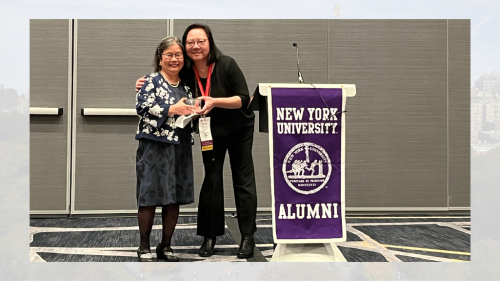Congratulations to the recipient of the seventh annual Jim Hinojosa Distinguished Alumni Award, Ai-Lian Lim, DPS, OTR/L.

The award, named in honor of the late Dr. Jim Hinojosa’s immense impact on the NYU Steinhardt Department of Occupational Therapy and the entire OT field, recognizes outstanding NYU OT alumni who are making significant contributions to the profession.
Ai-Lian Lim, DPS, OTR/L, earned her Diploma in Occupational Therapy at St. Andrew’s Hospital, England in 1977, a Master of Arts in Developmental Psychology at Teachers College, Columbia University in 1992, and a DPS in the NYU Department of Occupational Therapy in 2009. Dr. Lim’s OT career encompasses experiences in Europe, Asia, and North America, and she has been the Director of Occupational Therapy Services at Bellevue Medical Center since 1996. Under her leadership, Bellevue Hospital has garnered a reputation for providing the highest caliber of all-around training for occupational therapists. We recently talked to Dr. Lim about her career, her time at NYU, and her advice for future OTs. Please read on for the full interview.
What inspired you to pursue occupational therapy as a profession?
I was drawn to the Occupational Therapy profession because I am able to help people.
Please tell us about your journey to where you are today as an OT.
I have been extremely fortunate to receive so much support from so many people throughout my career. When I started, Occupational Therapy was a little-known profession in Southeast Asia, but my parents had the vision to send me to England where I obtained my first OT qualification from St Andrews, Northampton. After working in England for almost five years, I worked in the Spastic Center in Singapore for two years. I then returned to England to upgrade my diploma to a degree and to work for the London Hospital. I started as an OT for children with special needs, and then I became the Head of OT for the London Hospital (Tower Hamlets District). During the first ten years of my career, I acquired strong clinical experience in pediatric cases and with adults with physical dysfunctions. I learned so much and I am still learning from my mentor, Ms. Margaret Ellis.
I decided to come to the U.S. to obtain a certificate in Sensory Integration. I did not; instead, I found Motor Learning. I worked at the Rusk Institute of Rehabilitation for nearly 7 years before I was invited by Dr. Kieran to be the Director of OT at Bellevue Hospital, affiliated with NYU School of Medicine. It was during this time that I studied for my Master’s degree in Developmental Psychology at Teachers College, Columbia University and my clinical doctorate at NYU Steinhardt. With the tremendous support from Dr. Kieran, Dr. Kalva, administrators at Bellvue, and the OT staff, I was able to build our department from 7 to 29 OTs today. Besides managing the OT department, I have also had opportunities to work on projects with other leaders at Bellevue, for example Planetree Person- Centered Care, Implementation of EPIC, and Stroke and Trauma certification.
Throughout your career you have worked to help the profession respond to challenging events, such as Hurricane Sandy and the COVID-19 pandemic. Can you tell us more about that?
I was on vacation when Hurricane Sandy struck. Bellevue was shut down when I returned from vacation. When I arrived at Bellevue, the first person I met was Julie Combal, the Creative Art therapist, who was full of praise for the OTs who had worked during the hurricane under the guidance of the OT Assistant Director Judith Wilson. Four OTs had volunteered to work through the night to help with the evacuation of patients from Bellevue to other hospitals. I then started looking for OTs who had reported in that morning. I got permission to be escorted to the OT Department to get time sheets, phone numbers, and items I thought I might need to work outside of Bellevue. All the OT staff were spread among seven different OT Departments in the Health and Hospital Corporation, and I assigned Senior OTs to accompany Staff OTs.
During those three months, I visited the staff until we were able to return to Bellevue. I got to know the Heads of the OT departments of each hospital, and I am grateful they welcomed my staff. They praised the high standard of work our OTs contributed to their departments, and as a result, we started a HHC OT Directors group to share ideas and support each other in clinical work.
During Covid, we had to close our out-patient services, but we still had two groups: Med-Surg and Rehab groups. We got our daily briefs from the Director of Rehab. From there, we started developing programs. Together with the OT Supervisors of Med-Surg (Wendy Lee and her assistant Raechel Flaherty) and OT Rehab (Judy Wilson), we worked out our clinical program for patients with Covid. We also reviewed what we had learned about pulmonary rehabilitation and the anatomy of all the muscles involved in respiration to identify the muscle-wasting we were seeing in patients. We also implemented a four-day week for three months. Throughout this time safety came first to protect our staff while giving care, including the use of correct PPE, social distancing, storytelling for emotional relief, etc.
As a member of the NYU alumni network, you have been a generous resource when it comes to helping with students’ fieldwork training. How did your own time at NYU Steinhardt prepare you for your career?
I did my clinical doctorate at New York University. As I did most of my core work at the Wagner School of Public Health, my clinical doctorate at NYU gave me the skills to manage a public organization. My OT training in England, my Master’s in Developmental Psychology at Teachers College, Columbia University, and being a member of ACOTE helped, too. Each part of my education provided me with a different perspective.
What was it like to work alongside Jim Hinojosa, and what does winning this award mean to you?
Jim was my advisor for my Clinical Doctorate. I liked how he questioned me, and his wide perspective on different issues. Now I wish I had attended my convocation. I would like to have taken a photograph with Jim.
What would you consider the most significant accomplishment of your career so far, and why was it important for you?
My ability to perform well as both a clinician and a manager. At the end of the day, patients expect and trust us to make them “better.”
I believe a significant accomplishment was my appointment as a “visiting professor” in the OT Dept. of Universiti Kebangsaan Malaysia, where I felt appreciated, sharing my experience knowledge with OT students and professors.
What advice do you have for OTs and other service providers beginning their careers?
Love what you do. Be creative when solving problems. See an issue from different angles. Give your patient your best. Be humble. Know that your current best may not be “the best for the patient”: be a lifelong learner by continuously seeking the knowledge required to fill your knowledge gap.
I believe students should be confident to begin their first jobs, draw on their different clinical experiences (whether good or bad), recognize what they know and what they don’t, and start learning. Of course, students should always remember that patient care comes first. They should also be prepared for conflicts within the team. Conflicts can be healthy as it challenges us to give the best to our patients. As professionals, we need to be reliable and dependable.

